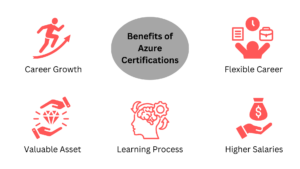Azure Certification
Obtaining an Azure certification proves your dedication to remaining up to date with the newest cloud technologies and best practices, in addition to showcasing your technical proficiency. Employers place a great value on this commitment to professional development.
Benefits of Azure Certifications
There are some major benefits of Azure Certifications. 1. Career Growth: Gaining your qualification in this field will undoubtedly increase your income because employers and most consumers can tell when someone has received additional training. After all, a Microsoft Azure certification helps experienced individuals and proves that they are professionals in their field. According to Business Wire, the cost of taking Azure certifications has increased by 20% to 40%.
1. Career Growth: Gaining your qualification in this field will undoubtedly increase your income because employers and most consumers can tell when someone has received additional training. After all, a Microsoft Azure certification helps experienced individuals and proves that they are professionals in their field. According to Business Wire, the cost of taking Azure certifications has increased by 20% to 40%.
2. Flexible Career: A Microsoft Azure certification online course covers a broad range of potential career paths. You could work as a developer, system architect, or cloud engineer. Your ability to work in a variety of sectors and locations is enhanced by your qualifications. Because of the tremendous benefits that cloud computing, networking, and storage offer, businesses across all industries are moving to the cloud.
3. Chance to become a Valuable Asset: You might be a great asset to any company if you have certification for validated Azure abilities and knowledge. Another benefit of having Microsoft Azure certifications is that you can help and encourage your company to manage IT expenses and additional setup fees by utilizing the pay-as-you-go functionalities.
Compared to other cloud services, Microsoft Azure offers strong connectivity between cloud and on-premises data centers. This is especially advantageous for SMEs, who can store all of their corporate infrastructure on the cloud. Having an understanding of Azure and Microsoft helps you stay up to date with the newest technological requirements and jobs.
4. Fast Learning Process: Microsoft Azure provides a condensed learning method for certifications that enables quick Azure learning. It’s not necessary to comprehend the purpose behind using each of these different Azure resources. There are tonnes of additional easily learned resources available, such as Hadoop, Xcode, and Eclipse.
Consequently, novices can effortlessly adjust to the platform and utilize Azure services. To get ready for the Azure certifications online courses, you can make use of internet resources including books, videos, university courses, and guidelines. However, technical online programs are more effective in helping students acquire practical knowledge.
5. Higher Salaries: One of the most important Azure certification benefits is the higher wages and greater brand awareness are other significant factors for being Microsoft Azure certified. As a specialist accredited by Microsoft Azure, your Azure certification courses demonstrate the expertise you have. With the greater competition for cloud computing professionals, relative to other IT sectors, you receive better executive salaries all across the globe. The professional Azure developer receives $131,838 each year, and the average Azure architect makes $144,866 per year, as per the ZipRecruiter salary report.
But, whenever the appropriate courses are completed and one has become a Senior Azure accredited practitioner, the salary can be increased. In various different countries and different parts of the globe, the wage ranges vary. The average wage of a specialist accredited by Microsoft Azure starts at $40,914 and probably accounts for $172,170 per year for senior positions, that is how Azure Certifications benefits you.
So, here we mentioned some benefits of having Azure Certifications. Hope now you understand how much it can be beneficial for your career advancement and higher salary packages.
Azure Certifications:
Here are some best Azure certifications after completing those you can avail of higher salary packages and enhance your career:
1. AZ-900 Certification: Azure Fundamentals
- Who It’s For: Those new to Azure or cloud services who don’t have a technical background are welcome.
- Covered Skills: Fundamental cloud concepts and Azure services, such as basic Azure services, security, privacy, compliance, and trust, as well as pricing and support for Azure.
- Prerequisites: There are no prerequisites, however having some general IT expertise or understanding is helpful.
Price: $99 USD
2. AZ – 104: Azure Administrator Associate
- Who It’s For: Those with experience administering cloud services, including storage, networking, and compute cloud capabilities, through Azure administration.
- Covered Skills: Managing Azure identities, storage, computing, virtual networks, and governance in a cloud context are among the skills covered.
- Prerequisites: Six months of practical Azure administration experience, along with a solid understanding of Azure workloads, security, and governance.
Cost: $165
3. AZ – 500: Azure Security Engineer Associate
- Who It’s For: Security and compliance-focused IT workers.
- Covered Skills: Implementing security policies, upholding posture, spotting vulnerabilities, and making use of a range of security technologies are among the skills covered.
- Prerequisites: Strong programming, security, and Azure service abilities are prerequisites.
Expense: $165 USD
4. DP – 300: Administering Microsoft Azure SQL Solutions
- Who It’s For: Database administrators and data experts.
- Covered Skills: Using Azure to manage relational databases, including performance, security, and availability.
- Prerequisites: Experience with Azure SQL and database fundamentals is required.
Cost: $165 USD
5. AZ – 305: Azure Architect Certification
- Who It’s For: Azure infrastructure solution-focused solution architects and engineers.
- Covered skills: The abilities covered include designing Azure-based solutions that take into account factors like computation, network, storage, and security.
- Prerequisites: Advanced familiarity with networking, virtualization, identification, security, business continuity, disaster recovery, data platforms, and governance are prerequisites.
Cost: $165 USD
6. AZ – 400: Azure DevOps Certification
- Who It’s For: Experts in Azure-focused DevOps positions.
- Covered Skills: Combining people, procedures, and technology to consistently provide valuable goods and services is covered in terms of skills.
- Prerequisites: Knowledge of Azure development and administration, as well as proficiency in at least one of these fields.
Cost: $165 USD
Understand the exam objectives
Review the exam objectives and competencies measured in detail beforehand. For every exam, this data is published on the official Microsoft certification webpage. You can more efficiently concentrate your study efforts if you know what is required of you.
Career Opportunities After Azure Certification
After earning an Azure certification, you can explore various cloud-related roles such as Cloud Architect, DevOps Engineer, and Azure Administrator. These positions leverage your expertise in Azure services, cloud security, and automation. Azure certifications enhance your career prospects by equipping you with in-demand skills for managing and securing cloud infrastructures.
1. Cloud Architect:
- What they do: Create and carry out a company’s cloud computing strategy, which includes management, application design, and adoption strategies.
- Required skills: Proficiency in Azure infrastructure and services, cloud security, and cloud solution architecture is required.
2. DevOps Engineer:
- What they do: Strive to enhance software development, deployment, and maintenance through the integration of development and operations.
- Required skills: proficiency with automation scripts, cloud service management, CI/CD pipelines, and Azure DevOps.
3. Azure Solutions Architecture:
- What they do: Create and put into practice intricate solutions that satisfy organizational needs.
- Required skills: Proficiency in Azure services, solution design principles, and architectural best practices is required.
4. Azure Administrator:
- What they do: Oversee and set up cloud services, encompassing computing, networking, storage, and security.
- Skills Required: Proficiency with Azure administration, PowerShell, Azure CLI, and cloud architecture is required.
5. Security Engineer:
- What they do: Protect data and cloud applications from intrusions.
- Skills Required: Required skills include threat mitigation, identity management, cloud security, and knowledge of Azure security technologies.
Conclusion
Hence, In this blog, we have covered the 6 Best Azure Certifications that you can do to enhance your career and grow financially. Also covered are what job positions you can apply for after qualifying for these Azure Certifications. We have also shared some benefits to qualifying for these courses.






No comment yet, add your voice below!